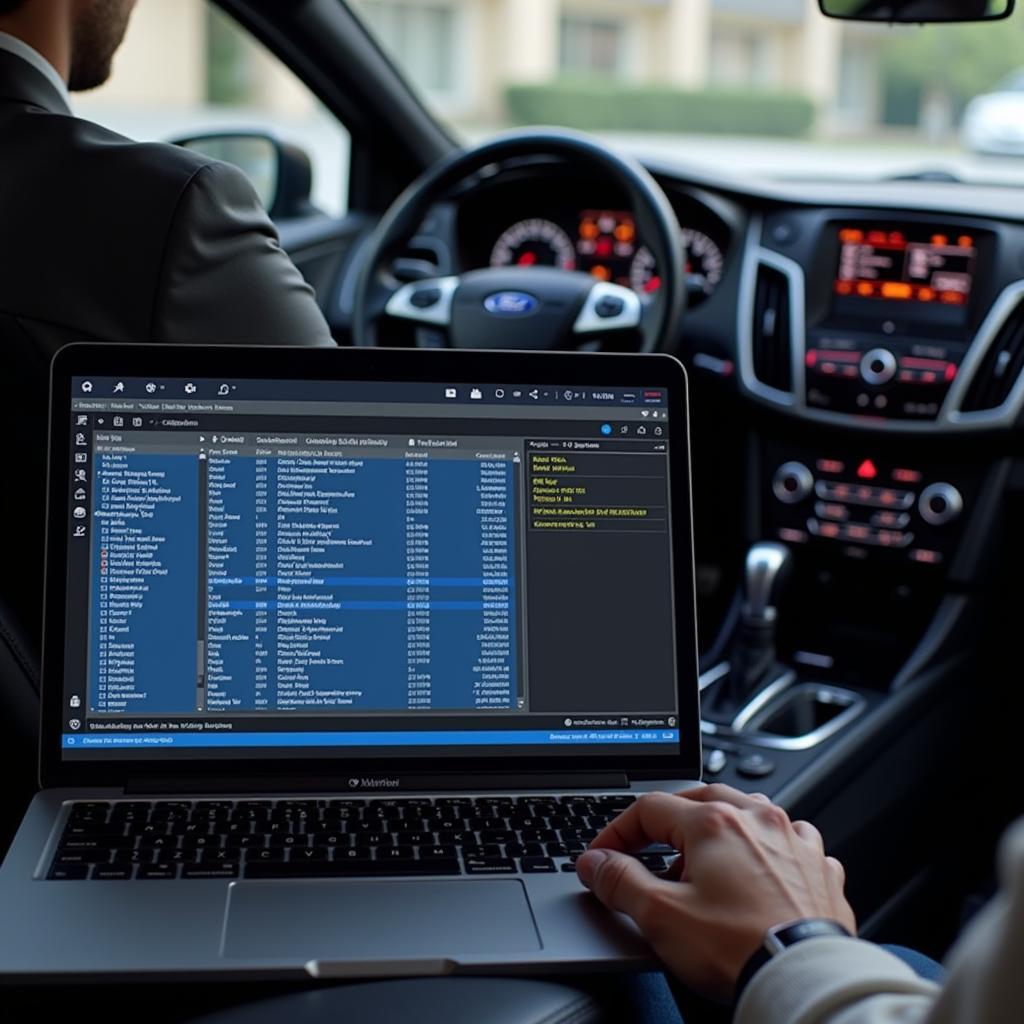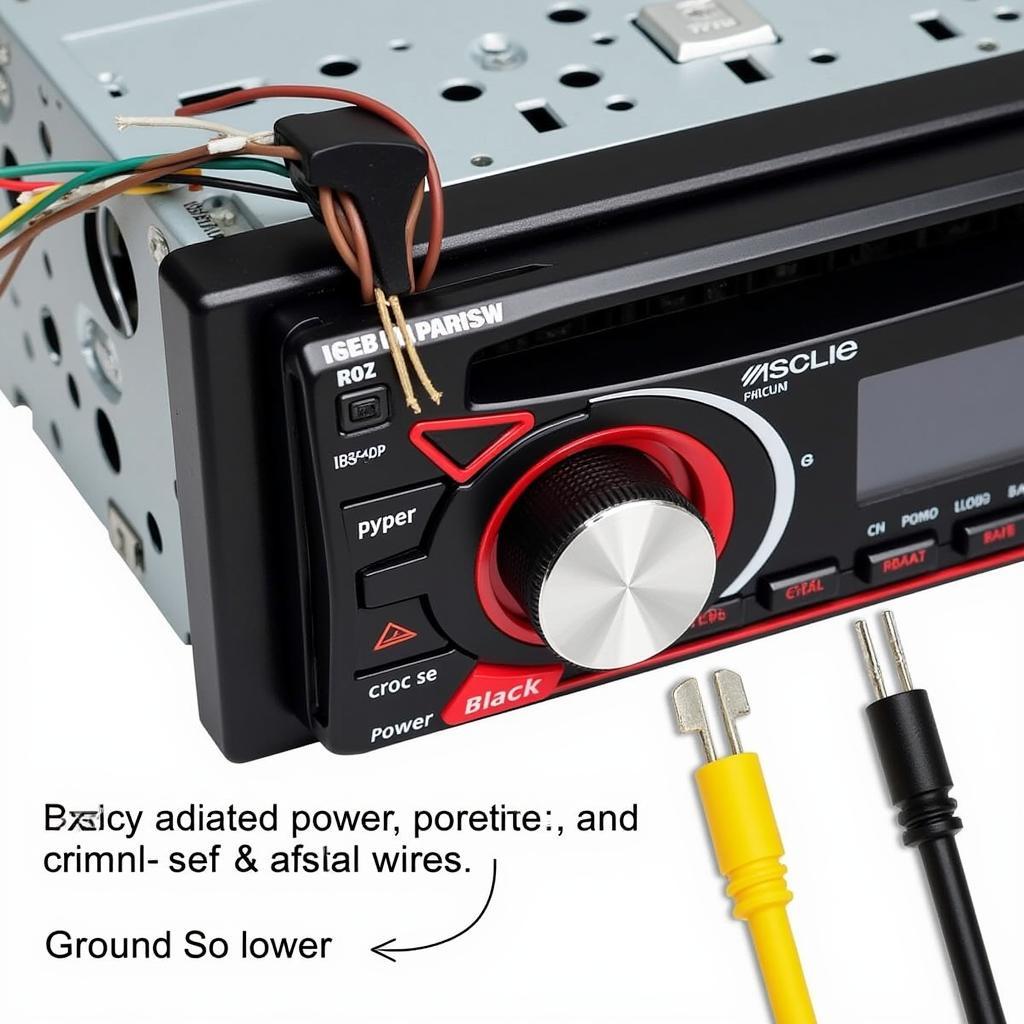The brake warning light on your Ford Focus dashboard is a crucial safety feature. While it’s normal for the light to illuminate briefly when starting the car, a flashing brake warning light while driving signals a potential problem within the braking system. Ignoring this warning could compromise your safety and lead to costly repairs.
Understanding the Ford Focus Brake Warning Light
Your Ford Focus utilizes a sophisticated system to monitor brake fluid levels, brake pad wear, and the overall health of your braking components. When the brake warning light flashes, it indicates a fault detected by the system, urging you to investigate the issue promptly.
Common Causes of a Flashing Brake Warning Light
Several factors can trigger a flashing brake warning light in your Ford Focus. Here are some of the most common culprits:
- Low Brake Fluid: This is often the primary culprit. Brake fluid naturally depletes over time, and a leak in the system can significantly lower the fluid level.
- Worn Brake Pads: Your Ford Focus is equipped with brake pad wear sensors. When the pads wear thin, the sensor triggers the warning light, indicating the need for replacement.
- Faulty ABS System: A problem with the Anti-lock Braking System (ABS), such as a malfunctioning sensor or module, can also cause the brake warning light to flash.
- Parking Brake Engaged: If you forget to disengage the parking brake completely, the warning light might flash, accompanied by a beeping sound in some models.
- Electrical Issues: While less common, electrical faults like a short circuit or a malfunctioning brake light switch can also trigger the warning light.
Diagnosing the Problem
Pinpointing the exact cause of the flashing brake warning light often requires a systematic approach:
- Check Brake Fluid Level: Safely park your car on a level surface and allow the engine to cool. Locate the brake fluid reservoir under the hood (refer to your owner’s manual). The reservoir usually has a translucent body with minimum and maximum level markings. If the fluid level is below the minimum mark, it needs to be topped up.
- Inspect for Leaks: While checking the fluid level, inspect the reservoir and the surrounding area for any signs of leaks. Look for wet spots, drips, or a noticeable drop in the fluid level over time.
- Examine Brake Pads: Visually inspect the brake pads through the spaces between the wheel spokes. If you see less than ¼ inch of friction material remaining, it’s time for a replacement.
- Consult a Professional: If you’re unable to identify the cause or suspect a more complex issue like a faulty ABS system or electrical problems, it’s crucial to seek professional assistance from a qualified mechanic specializing in Ford vehicles.
What to Do When the Brake Warning Light Flashes
A flashing brake warning light demands immediate attention. Here’s what you should do:
- Stay Calm: Avoid panicking. Maintain control of your vehicle.
- Reduce Speed: Gradually decrease your speed and avoid sudden braking.
- Find a Safe Spot: Carefully maneuver your Ford Focus to a safe location off the road, such as a parking lot or the shoulder of the road, away from traffic.
- Assess the Situation: Once safely parked, turn off the engine and put on your hazard lights. Assess the situation using the steps outlined in the “Diagnosing the Problem” section.
- Seek Help: If you’re unable to identify or fix the problem, contact a qualified mechanic or roadside assistance for professional help.
[quote|John Miller|Senior Ford Technician at ABC Auto Repair|”A flashing brake warning light should never be ignored. It’s a critical safety alert that often indicates a serious problem within the braking system. Timely diagnosis and repair are essential for your safety on the road.”]
Remote Diagnostics and Software Solutions for Ford Focus Brake Issues
Advancements in automotive technology have paved the way for remote diagnostics and software solutions that can help address certain brake-related issues in your Ford Focus.
- Remote Diagnostics: Some advanced diagnostic tools allow qualified technicians to remotely access your Ford Focus’s onboard computer system to retrieve fault codes and analyze real-time data related to the braking system. This can be particularly helpful in pinpointing the root cause of the problem, especially for issues related to the ABS or electronic components.
- Software Updates: Occasionally, software glitches or outdated software versions in your Ford Focus’s braking system control modules can trigger false warning lights or affect braking performance. In such cases, a qualified technician can remotely install software updates to rectify the problem.
 Ford Focus Remote Diagnostics
Ford Focus Remote Diagnostics
It’s important to note that not all brake problems can be solved remotely. Issues requiring physical repairs or component replacements still necessitate a visit to a qualified mechanic.
Preventing Future Brake Problems
Maintaining your Ford Focus’s braking system proactively can help prevent future issues and ensure optimal braking performance:
- Regular Brake Fluid Checks: Make it a habit to check your brake fluid level at least once a month and top it up when necessary.
- Timely Brake Pad Replacement: Replace your brake pads before they wear down completely. Consult your owner’s manual or a qualified mechanic for recommended replacement intervals.
- Adhere to Service Schedules: Follow the recommended maintenance schedule outlined in your Ford Focus owner’s manual. This includes periodic brake inspections and fluid flushes by a qualified technician.
Conclusion
A flashing brake warning light on your Ford Focus is a serious safety concern that should never be disregarded. By understanding the potential causes, following the recommended diagnostic steps, and seeking professional assistance when needed, you can ensure the optimal function of your braking system and, most importantly, your safety on the road. Remember, proactive maintenance is key to preventing future brake problems and enjoying a worry-free driving experience. If you’re experiencing a ford focus brake fluid low warning, it’s best to address it immediately. You can learn more about the common warning signs of brake problems to stay informed and prioritize your safety. If you notice a brake warning light on dash, don’t hesitate to consult your owner’s manual or a professional mechanic for guidance. There are also resources available online, such as guides on how to ford focus reset low brake fluid warning, but it’s crucial to exercise caution and ensure you’re comfortable performing any procedures yourself.

